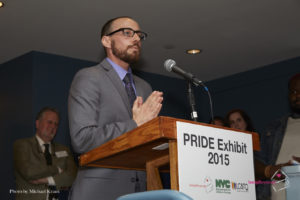What is the difference between inclusion and belonging?
Inclusion is defined as the state of being taken in. Belonging is defined as being in close or intimate relationship. It goes beyond simply being at the table, but being truly listened to and valued.
Recently the discussion of belonging has come to light via two professionals within my sphere:
• Gracie Johnson-Lopez, Founder and Inclusion Strategist with Diversity&HR Solutions, who recently spoke on this topic at our monthly Triangle (NC) Society of Human Resource Management (TSHRM) meeting.
• Rhodes Perry, Founder of Rhodes Perry Consulting. Rhodes, a transgender man, does leadership coaching and inclusion consulting, and is a fellow certified LGBT-Business Enterprise.
First, the insights from Gracie’s presentation “Creating Cultures of Belonging” at the October 25, 2018 TSHRM monthly meeting. Gracie kicked off the session showing a gripping 3.5 minute video, “Inclusion Starts with I” which has received over half a million hits and highlights how all people want to belong in their workplaces.Some other information that Gracie shared:
• The face of America and the world is changing, and we all have a adapt to succeed. Globalization makes it easier for any business to do business and have employees anywhere in the world. Millennials in the workplace continue to grow. And while Christians will increase 35%, the worldwide Muslim population will increase 78%. All these segments of people will need to feel that they belong for an organization to thrive.
• In Maslow’s hierarchy of needs, belonging is the first psychological need after the basic physical needs of safety, food and shelter. And given the number of hours we spend at work, it makes sense that have a feeling of belonging in the workplace is important.
• So often people, especially minorities, are physically included and present, but not truly listened to and treated as they fully belong.
• Gracie shared 6 tools for creating a sense of belonging in communications, and 7 steps to building a culture of belonging. If you want more detail, perhaps contact and engage Gracie for your business or group via her website.
Second, insights from Rhodes Perry. Rhodes recently shared in an email to his constituents:“Feeling like you don’t belong in your place of work is stressful. It is uncomfortable, demoralizing, and takes away from your potential to offer your unique gifts and talents to your work. ⠀
⠀
I remember this stress well. Mine derived from constantly having to place a veil over my authentic self. Namely, I withheld sharing that I was assigned female at birth, and covered important aspects of my gender history, as they were relevant to particular conversations in the workplace. ⠀
⠀
Not fitting in during this early employment period of my life motivated me to become a diversity, equity, and inclusion professional and my continued work with organizations of all kinds has motivated me to write this book. ⠀
⠀
I believe we can change the culture of work for the better so we can all truly feel we belong and show up as our authentic selves. I encourage you to share your story with someone at your workplace or a close friend or family member. By sharing our experiences, we can make room for inclusive cultures…together.”
Rhodes’ book, “Belonging at Work: Everyday Actions You Can Take to Cultivate an Inclusive Organization” launches November 13th, on World Kindness Day! Link to info on receiving the book.





